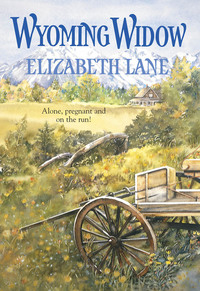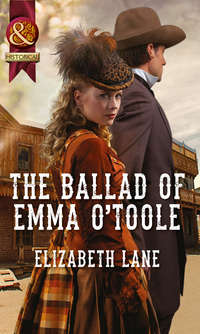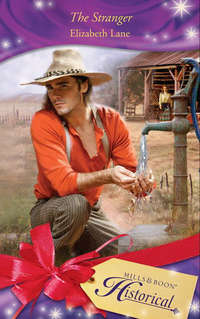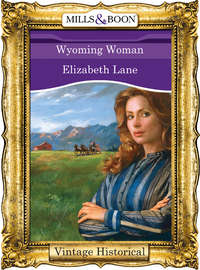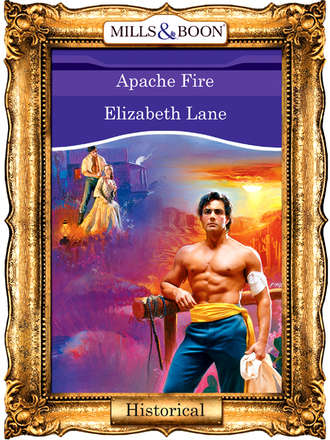
Полная версия
Apache Fire
A wild animal
The man at her side had that same hunted air about him, and no matter how he might be suffering or what he might tell her, Rose knew she could not afford to trust him.
They had gained the porch. The stranger was reeling like a drunkard. It was all Rose could do to keep him upright. All the same, she forced herself to stop short of the door.
“I’m not taking you under my roof until I know,” she declared, bracing her weight against his ribs. “Who are you? What did you want with my husband?”
“Latigo.” He spoke with excruciating effort. “I knew your husband from the Apache wars. He said if I ever needed help…”
The words trailed off as his knees buckled, then his body collapsed in Rose’s arms. She tried to hold him, but his weight was too much for her. His blood left a streak of crimson down the skirt of her dark blue wrapper as he slid to the porch, shuddered and lay still.
Panic shrilled alarms in Rose’s head as she groped for his pulse. Reason argued that she and the baby would be safer if he died, but when her fingertips, searching along his jugular, found a weak but steady flutter, she broke into a sweat of relief. He was alive, but his life was trickling away with every heartbeat. There was no time to lose.
Urgency, now, drove her to fling open the door and seize the stranger’s feet, one booted, one covered only in a half-disintegrated dark woolen sock. As she dragged him along the tiles toward the kitchen, Rose prayed silently that she would know what to do. She had nursed the cuts and sprains of the vaqueros and cared for John during those last terrible months when he lay barely aware of her, but she was no doctor.
He groaned as she turned his body to slide it across the threshold into the kitchen where she kept water and medical supplies. “I know it hurts,” she muttered, “but I have to get you in here where I can work on you.” Rose shoved back the table to clear more space, then maneuvered him into position. She would have to dress his wound on the floor. Unless he could get up by himself, there was no way for her to lift him onto anything higher.
Water. Yes, he would need all the fluids she could force down him. Rose darted to the counter and filled a pottery cup from the tall pewter pitcher. Moonlight etched ghostly windowpane squares across the tile as she crossed the kitchen and dropped to her knees beside him.
The stranger—Latigo—moaned as she lifted his head and cradled it in her lap. His face was in shadow, so obscuring his features that she had to grope for his mouth. His skin was as smooth as new leather beneath her fingertips. An unexpected tenderness surged through her as she tipped the cup and pressed it to his cracked lips. “Drink,” she murmured. “Please—you’ve lost so much blood.”
At first he did not respond. The water filled his mouth until Rose feared she would drown him. It trickled out of one corner to run down her sleeve as she tilted his head to keep him from choking. Please, she begged silently. Please.
He sputtered weakly. Then she felt the ripple of his throat as he began to swallow. “Yes,” she whispered, tipping the cup higher to give him the last drops. “Yes, that’s it, drink it all.”
She withdrew the cup, then hesitated, wondering whether she should get him more water. No, she swiftly concluded, too much at one time might make him sick, and she could wait no longer to stop the bleeding.
“Latigo, can you hear me?”
He made no sound.
“Latigo!” Sick with dread, she seized his shoulder and shook it. Relief swept through her as he moaned incoherently.
“I’ve got to clean out your wound. It’s going to hurt Do you want some whiskey?”
Again he did not answer, and Rose realized she was wasting precious time. Leaving him where he lay, she scrambled to her feet and strode to the cupboard, where she rummaged for matches to light the lamp that Esperanza kept on the counter. By its flaring yellow light she filled a basin with water, then retrieved her medical kit, some clean rags and a bottle of John’s rye whiskey from the pantry. These she placed on the shadowed floor next to Latigo’s unconscious body. Then she rushed back to fetch the lamp from the counter.
Light danced eerily off the open-beamed ceiling as she picked up the lamp. It glistened on hanging copper pots and flickered on strings of garlic and dark red chilies as she hurried across the kitchen. The tiles were smooth and cold beneath her bare feet.
Latigo had not moved. He lay where she had left him, the agonized hiss of his breathing his only sign of life. Light pooled around his lanky frame as Rose bent down to set the lamp on the floor. It flooded his face, casting his features into stark relief—the tawny skin, the straight nose and sharp, high cheekbones, the long, square jaw, the broad forehead, crowned by hair as black as the wing of a raven.
Rose’s flesh had gone cold. Panic surged through her body, propelled by memories so vivid and terrible that she could not fight them back. The smoke. The blood. The savage, painted faces.
She closed her eyes, battling instincts that threatened to send her bolting out of the kitchen. The man was helpless, she reminded herself. He would die without her aid. Maybe he would die anyway, but she had no moral choice except to try to help him.
Rose willed her eyes to open, willed herself to look down at him as she reached for the basin and a clean cloth. She would perform her Christian duty, she resolved. But no charity on her part could wipe out the horror of the past.
And nothing could alter the fact that this dark stranger, this man who called himself Latigo, wore the face of an Apache.
Chapter Two
He was running free, his boyish legs bounding along the rocky crest of a sage-swept ridge. The dawn wind whispered in his long, black hair. The soles of his moccasins skimmed the path as he mounted higher and higher, pursuing some precious golden thing that glimmered just beyond sight and reach. “Seek, boy,” the aging di-yin had told him. “Climb high. Only then will you find the path to who you are and where you must stand.”
Latigo awoke to thin gray light as the dream faded. His body jerked to sudden awareness. His eyelids fluttered open. Then, with a caution born of dangerous years, they swiftly closed to narrow slits, allowing him to size up his situation before moving.
His shoulder burned like hellfire, but the tightness of new wrappings told him his wound had been dressed. However badly or well remained to be seen. Someone had put a clean shirt on him that scratched his neck and smelled of laundry soap. That was something a woman would do, he reasoned foggily.
A woman.
Yes, his memory was beginning to clear. Latigo’s ears recalled the husky timbre of a white woman’s voice, telling him to lie still, but her face was nothing but a disembodied cloud. Someone had dragged or carried him indoors because he was lying on a hard floor, covered by a fleecy wool blanket that smelled of cedar, as did the pillow that supported his head. But where was he? What had happened last night? Think, man.
Latigo’s tongue was a dry pebble, his throat so brittle with thirst that he could not bring himself to swallow. His hands stirred, then froze as he realized his wrists and ankles were bound with some sort of coarse, soft twine.
The discovery sent a shock jolting through his system. Latigo’s pulse jumped, snapping his senses to sudden clarity. He remembered the ambush, the long, punishing ride through the desert and the sight of the ranch gate. He remembered slipping into blackness, then waking up on the ground, scraped and battered, with one boot twisted in the stirrup. He remembered a woman with a pale, frightened face and moonswept hair. He remembered her eyes, violet blurs, their color startling even by moonlight.
And he remembered that John Colby was dead.
Latigo fought the urge to struggle against the ties that wrapped his wrists and ankles. Whoever had taken him prisoner was likely close by, maybe watching him right now. To preserve the element of surprise, which was his only weapon, he would have to remain perfectly still.
His pupils shifted warily beneath half-closed eyelids as he strained to see in the wan morning light. Off to his right, he could make out the legs and underside of a massive wooden table, and beyond that the tiled base of a cast-iron stove. The kitchen appeared large enough to contain an entire Apache rancheria, but then, that should come as no surprise, Latigo reminded himself. The size of white men’s dwellings tended to far outstrip their needs, and John Colby owned, or had owned, the biggest spread of land south of the Gila.
Latigo’s furtive gaze scanned the room, lingering on the solid, lime-washed walls, the padlocked plank door and the high, iron-grilled windows. The place was built like a stockade, he groused, feeling more and more like a caged animal. Even if he could get untied, escaping from such a fortress would not be easy.
By now his body had fully awakened to its discomfort. His skull throbbed like the dull beat of a tom-tom. Every breath lanced agony through his wounded shoulder. His back and legs ached from lying on the cold floor, and hunger clawed at his stomach—good signs, he reminded himself. Pain and hunger meant his body was alive and fighting.
Shoving his useless physical complaints aside, Latigo continued his furtive exploration of the kitchen. He glimpsed an open door, leading, he surmised, to another room in the house. To the right of the doorway— Latigo’s breath stopped.
On a bench beside the door, bathed in a shaft of morning sunlight, a young white woman sat nursing a baby.
Thunderstruck, he studied her through the screen of his lashes. Propriety, drilled into him by years in the white man’s world, warned Latigo that he had no business casting eyes on such a woman. But his gaze was drawn to her.
The top of her robe had fallen to one side, baring the slope of her shoulder and the ripe, satiny curve of her breast, concealed only where the baby’s round head lay dark against her creamy skin. Tiny sucking sounds drifted to Latigo’s ears, triggering an unexpected tightness around his heart, an unspoken hunger for the warmth and tenderness he had lost as a child and never known as a man.
Not that the sight was new to him. Chiricahua mothers nursed their children openly in the rancherias. But something about this woman, her tenderness, her vulnerability, struck a quivering chord of response. She reminded Latigo of a painting he had seen once in an old Spanish church, a careworn Madonna cradling her heavenly infant, her expression so poignant and knowing that it haunted him to this day.
In happier times John Colby’s widow would have been a radiant beauty, he mused, his eyes tracing one sunlit curl where it tumbled like a swirl of honey over her bare shoulder. But the desert was not kind to pretty, young white women. Hot sun and parched air burned the life out of them in a few short years. Hard work and childbearing usually finished the job by the time they were thirty. This one had already begun to fade. Still, there was something about her, a soft resilience like the luster of tumbled river stone.
But he had more urgent things to do than gape at a woman, Latigo told himself harshly. Right now, his most pressing concern was getting untied and finding a way out of this place.
He forced his gaze lower. That was when he noticed the heavy pistol lying on the bench beside her, its barrel glinting in a finger of sunlight. He went cold inside as the truth sank home.
This woman was both his rescuer and his jailer. She had cleaned and dressed his wound, then bound him hand and foot and kept guard with a pistol to make sure he didn’t escape.
Latigo cursed his own rotten judgment. He had made his first mistake in seeking refuge here, gambling his safety on the word and reputation of a white man he had not seen in years. And he had made his second mistake in trusting Colby’s fragile-looking young widow.
She had saved his life. But what good would that do him if she’d sent for the law—or worse, if she were associated with the bastards who had murdered the two government agents? Either way, he would be a dead man.
Latigo’s gaze lingered for an instant on the woman’s wistful Madonna face. Maybe she hadn’t betrayed him after all, his instincts whispered. Who knows what he might have said or done in the midst of his pain and exhaustion. Maybe he had frightened her, and she had tied him up to protect herself.
Maybe, but that was a chance he could not afford to take. Somehow he would have to win her confidence and persuade her to untie him—that, or untie himself. Once he got loose, it would be easy enough to get his hands on the gun and make a fast getaway.
Knowing there was little time to lose, he closed his eyes, moved his head slightly, and feigned a semiconscious moan.
Rose had been drowsing, lulled by her own weariness and the soothing tug of the tiny mouth on her nipple. At the low sound from the man on the floor, her eyes shot open. She jerked bolt upright, her frayed nerves screaming.
The Apache, Latigo, was stirring beneath the blanket. His long legs strained at the thick wool yarn her shaking hands had wrapped around his ankles. His eyelids opened, then swiftly closed.
Only then did Rose realize her breast was exposed. Hot faced, she flung a corner of the baby’s blanket over her bare shoulder.
The stranger’s eyes opened again. This time his feral gaze swept her defiantly from head to foot. Feeling as vulnerable as a nesting dove, Rose gulped back her fear and forced herself to speak calmly.
“I’ve sent a man into Tucson for the sheriff,” she lied. “Until he gets here, I suggest you keep still unless, of course, you want to open up that bullet hole and risk bleeding to death. I won’t bind it for you a second time.”
His obsidian eyes glinted like a captive hawk’s. “Did anybody see to my horse?” he asked, as if his own condition were of no importance.
“Your horse is in the corral with the others. There’s plenty of hay and water there.” That much, at least, was true. She had unsaddled the poor, spent animal herself and turned it in with her spare cow ponies. She remembered fingering the long, coiled whip as she carried the saddle to a dark corner of the barn. She remembered the worn boot, still tangled in the stirrup leathers.
“You were lucky.” Rose spoke boldly, even though the mere act of touching an Apache had all but drained her of courage. His bleeding body, so close, so real, had rekindled her nightmare in all its horror. Even now, it was the most she could do to meet his fierce black eyes without cringing. “From the looks of your shoulder, the bullet passed through without hitting anything vital,” she said. “But you’ve lost a dangerous amount of blood. That’s why you must keep absolutely still.”
“Is that why you’ve trussed me up like a bald-faced calf at branding time?” His sharp-edged words challenged her in English that was as fluent as her own. This Latigo, whoever he might be, was clearly no ordinary reservation Apache.
“I don’t intend to hurt you,” he said, his gaze flickering toward the pistol on the bench. “Just cut me loose, give me some food and water and a fresh horse, and I’ll be on my way. That’s the least you owe me.”
“Owe you?” Rose clutched her son beneath the blanket, remembering, now, what he had said about collecting on an old debt. “Your business was with my husband, not with me,” she declared coldly. “I’d never set eyes on you before last night. What could I possibly owe you?”
His black eyes narrowed. “The last ten years of your husband’s life.”
His words struck her with the impact of a slap. Rose stared at the man, rifling her memories for some spark of recognition and finding none.
“John never mentioned his life being saved by anyone, let alone an Apache,” she retorted, flinging the words with a bravado she did not feel.
He flashed her a contemptuous look. “For whatever it’s worth to you, Mrs. Colby, only half of me has the honor of being Apache. My mother was a Chiricahua, my father a Spanish Basque. But I’m telling the truth about your husband. I saved his life ten years ago when I led his company out of an ambush in the Dragoon Mountains.”
“The Dragoons?” Rose’s sleep-fogged mind searched what she knew of the past. When Cochise’s bloody uprising had flared in the mid 1860s, John Colby had helped organize a volunteer militia out of Tucson. As its captain, he had bravely led more than a score of forays against the Apaches. On one excursion along the Gila, he’d come across a seventeen-year-old girl wandering the desert in a state of shock, her family murdered and their wagon burned. A widower nearing fifty, he had taken the dazed young Rose Thomas home to his ranch and, a few weeks later, made her his bride. Within days of their marriage, he was riding patrol again.
All this Rose remembered. But she had no recollection of John’s discussing the Dragoon Mountains. Apart from ranch matters, he had communicated little with her when he was home. He had never told her where he’d been or described the things he’d done. And he had surely never mentioned a man named Latigo.
The stranger waited, his eyes flinty with distrust. It would be dangerous to lie to such a man, Rose calculated, but then, hadn’t she lied to him already?
“Did you ride with John’s militia?” She asked, knowing a yes would trap him in his own deception. John Colby and his fellow volunteers had hated Indians and would never have tolerated Apache blood in their ranks.
Latigo’s thin mouth tightened in response to her question. “I was scouting for the army,” he said, gritting his teeth against the pain in his shoulder. “We didn’t much care for the local militia boys. The trigger-happy fools tended to stir up more trouble than they prevented—”
“Why, that’s not so!” Rose interrupted, flaring with sudden outrage. “My husband’s militia protected settlers all over this part of the territory! They were heroes!”
The look he gave her was so scathing that it shocked her into silence. “More than once we had to rescue them from disasters of their own making,” he continued in the same flat tone, as if she had not spoken. “That’s how I met your husband.”
He shifted sideways on the floor, straining upward as if he were struggling to sit.
“Lie still,” Rose spoke in a sharp whisper. “I told you, you’ll start the bleeding again.”
His eyes burned their desperation into hers, silently urging her to cut him loose and let him go. But her own fears shrilled the warning that she could not trust this man. Last night he had pointed John’s gun at her and threatened to shoot her with it. She had no choice except to keep him bound and helpless.
Beneath the blanket, the baby’s warm little body stirred, then settled into slumber. Rose felt the stranger’s wild, dark presence like an aura in the room. The skin at the back of her neck tingled as his gaze flickered over her, lingering on her face, probing the depths of her courage.
“What have you done?” she demanded in a low, tight voice. “Who are you running from?”
Hesitation flickered across his face. Then his expression hardened, and Rose realized that his distrust was as strong as her own. “You wouldn’t believe me if I told you,” he said, wincing as he spoke. “But I give you my word, I’m not a criminal.”
“How can I be sure of that?”
“I’m not a liar, either.” His eyes locked Rose’s in a proud gaze that defied her to doubt him. Against her will, her thoughts flew back to last night. She remembered cradling his head between her knees to keep him still as she cleaned his wound. She remembered the smoky fragrance of his hair and the feel of his flesh beneath her fingers, cool and hard, like living bronze. On touching him for the first time, a freshet of disturbing heat had surged through her body. Rose felt it again now as his gaze gripped hers.
Every instinct told her the man was dangerous. But she had to be sure. If he had saved her husband’s life, she had no right to turn her back on him, not until she had some idea of what was in his heart.
“Tell me what happened,” she said. “I can’t promise to believe you, but I think I’m entitled to hear your story.”
Morning sunlight warmed the quiet air, melting the shadows in the corners of the kitchen. Latigo hesitated, then his eyes narrowed with the effort of collecting his thoughts. He was weak from pain and blood loss, she knew, but Rose resolved not to spare him until she had heard everything.
“Untie me,” he said. “I won’t harm you.”
“No.” She shook her head. “Not yet.”
His eyes flashed, as if he had sensed a weakening in her resolve. Rose’s arms tightened around her son. “Go on,” she said, lifting her chin. “You said you were a scout. Did your trouble have something to do with the army?”
“The army?” His bitter chuckle ended in a grunt of pain. “Believe me, there were no soldiers in sight Just two government inspectors, all the way from Washington. I’d been assigned to guide them on a tour of the San Carlos.” His eyes narrowed to slits, as if he were trying to shut out something he didn’t want to see again. “They’re dead—shot from ambush, both of them. The bullet that went through my shoulder was supposed to have killed me, too.”
“Apaches?” The word sprang without thought to Rose’s lips.
His glare cut her off like the flash of a blade. “Not Apaches. Not unless Apaches are sporting store-bought Stetsons, Springfield rifles and fifty-dollar saddles these days. They were as white as you are, Mrs. Colby, and I saw them murder two federal agents. That’s why they can’t afford to let me live.”
Rose stared at his sharp Apache features, struggling against the nightmare that lurked in the shadows of her mind. She smelled the smoke, heard the screams…
“That sounds like a wild tale if I ever heard one!” she heard her own voice saying. “What if I choose not to believe you?”
Latigo’s eyes hardened. “That’s your choice.”
“But it doesn’t make sense! One might expect it of Apaches, but why would white men do such a thing?”
The question caught in her throat as the clatter of galloping hoofbeats and the snort of a horse echoed across the front yard. Rose’s head swung toward the window as the long night’s strain crashed in on her. She was so tired, so scared, and now, at last, somebody was here.
“Turn around, Mrs. Colby—slow and easy, now. I don’t want to hurt you.”
Rose’s heart plummeted as she realized what had happened. All the while Latigo was talking, his hands had been busy beneath the blanket, stretching and loosening the yarn that held his wrists. She had glanced away for the barest instant, but he had struck with a rattler’s quickness to seize the pistol from beside her on the bench. Now the weapon was in his right hand, its muzzle thrusting up at her. Instinctively she shifted her body to shield her son.
“Who’s that outside?” he demanded in a low voice. “You said you sent for the sheriff.”
“No.” Rose blurted out the truth. “I had no one to send. I lied to you because I was afraid.”
“Then who’s outside?” He was struggling to sit up, his jaw clenched against the pain.
“I don’t know. But if you’re telling the truth about the murders, why are you holding a gun on me now? Why didn’t you go to the sheriff and report those men?”
Latigo’s free hand yanked the yarn from around his ankles. He gripped the edge of the table and hauled his way to his knees, then to his feet. The heavy Colt quivered unsteadily in his hand.
“What makes you think the sheriff would believe me?” His black eyes glittered with irony. “After all, you didn’t.”
Rose could only stare at him as a sharp rap sounded on the front door. The hour was far too early for a social call. Maybe it was one of the vaqueros. Maybe something had gone wrong in the mountains.
The rap on the door became an insistent pounding. Latigo’s eyes met Rose’s in terse confirmation that the visitor was not about to give up and go away.


